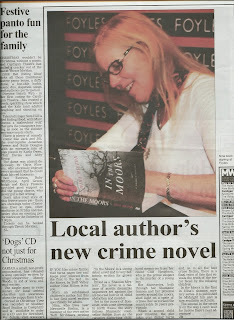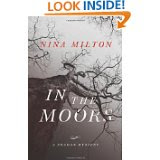20518
Followers
29
Following
Sabbie Dare and Friends
I have been writing fiction since my reception teacher, Mrs Marsden, put a paper and pencil in front of me. I can remember thinking; What? Do real people write these lovely books? I want to do that! I gained an MA in creating writing and sold my first books for children; Sweet’n’Sour, (HarperCollins) and Tough Luck, (Thornberry Publishing), both from Amazon. I also love writing short stories and they regularly appear in British anthologies.
I now write crime fiction, published by Midnight Ink. The idea for In the Moors , my first Shaman Mystery came to me one day, in the guise of Sabbbie Dare. She came to me fully formed and said; “I'm a young therapist, a shaman, and sometimes I do get very strange people walking into my therapy room. Honestly, I could write a book about some of them...”
I am a druid; a pagan path which takes me close to the earth and into the deep recesses of my mind. Shamanic techniques help me in my life - in fact they changed my life - although, unlike Sabbie, I’ve never set up a therapeutic practice...I’m too busy writing and teaching creative writing with the Open College of the Arts. I’m a fellow of the Higher Education Academy.
Although I was born, educated and raised my two children in the West Country, I now live in west Wales with my husband James.
IN THE MOORS, the first Shaman Mystery starring SABBIE DARE was released in the US in 2013 and UNRAVELLING VISIONS will be out this autumn, but you can already reserve your copy on Amazon.
Join me on my vibrant blogsite, http://www.kitchentablewriters.blogspot.com where I offer students and other writers some hard-gained advice on how to write fiction.
The Very Hard Work of Getting Published
— feeling amazing 

The Very Hard Work of Getting Published
“It’s bloody hard work.”
Every single student I’ve ever had, who got their contract in the end, would endorse that sentiment. I’d endorse that sentiment!
You have to work very, very hard, and often for a very, very long time. No let up, and perhaps not even a glimmer of hope on the horizon to keep you going.
When I started to write I had two small children and a part-time job. working nights so that their father could be there when I wasn’t. I didn’t have much time to write. Then, just as I got going, my mother developed severe dementia and came to live with us. That cut down my time even further. In fact, there was always something that could get in the way of writing regularly, and indeed, I didn’t always manage to write regularly, but I tried not to give up. I worked my way through my first children’s novel and found an agent. Eventually, that magical contract with HarperCollins appeared on my door mat (yes, it was the door mat, back in those days). People started to ask me what one needed to write successfully. And I kept telling them.
“Bloody hard work.”
There are three main kinds of bloody hard work attached to the production of a novel. The first is the hard graft of the start. Have you filled three notebooks with ideas and snatches of prose which you’ve discarded, half used, or actually included? Have you yet thrown away half your novel and gone back to the beginning? Have you asked someone to look at the glimmerings and been slated on what you showed them? If not, you haven’t lived. And you certainly haven’t worked hard enough yet. Tossing out a lot of early work is part and parcel of the ‘first novel experience’. (Along with a lot of…yep…hard work.)
 The second stage is completion. You’ve now actually got a draft that you’re pleased with. Heck, you might be actually proud of it, and so you should be; getting to this stage deserves huge congratulations from everyone who knows you. (It might also get huge sighs of relief, but that is a premature emotional reaction on their parts.) Believe me, this second stage is hard work. Mentally – you’re glued to a computer while you try, and try again, to formulate a synopsis that will do your novel justice, plus a covering letter that is neither too showy nor too dull. Physically, you need sheer grit and determination to go on when you realise that the synopsis and covering letter needs to be written, with slightly differing nuances, every time you send it out. Emotionally, it’s hard too, when back they bounce. Steadily, you work your way through the Writers and Artist’s Year Book, but no one wants you yet. Then, all at once, some one does want to see the entire book and you realise there may still be typos and other potholes. You need to go through it with a fine tooth comb. When the manuscript returns with a kind of ‘yee-ees…’ you discover that this agent or editor wants heaps more work done.
The second stage is completion. You’ve now actually got a draft that you’re pleased with. Heck, you might be actually proud of it, and so you should be; getting to this stage deserves huge congratulations from everyone who knows you. (It might also get huge sighs of relief, but that is a premature emotional reaction on their parts.) Believe me, this second stage is hard work. Mentally – you’re glued to a computer while you try, and try again, to formulate a synopsis that will do your novel justice, plus a covering letter that is neither too showy nor too dull. Physically, you need sheer grit and determination to go on when you realise that the synopsis and covering letter needs to be written, with slightly differing nuances, every time you send it out. Emotionally, it’s hard too, when back they bounce. Steadily, you work your way through the Writers and Artist’s Year Book, but no one wants you yet. Then, all at once, some one does want to see the entire book and you realise there may still be typos and other potholes. You need to go through it with a fine tooth comb. When the manuscript returns with a kind of ‘yee-ees…’ you discover that this agent or editor wants heaps more work done. Heaps. Of very, very hard work.
It’s such bloody hard work being a writer!
.
At least, when you reach that stage, you, along with all other professional writers, can reassure the new guys that your novel didn’t just come out of the air.
Please do this – don’t let them believe that you glibly typed away for a couple of hours a week and then success just happened without further effort. Please tell them that you:
- Filled up notebooks
- Had times you didn’t believe in yourself
- Wrote half a novel and dumped it
- Had further times when you didn’t believe in yourself
- Took two years of back-aching, sight-failing keyboard work.
- Almost had to start again anyway.
- And that you’re still working hard to this day.
 At that point, you’ll also know, as my friend knows now, just how important it is that people they know buy their new book. That it took a long time to craft it into a readable novel, and that it’s really worth reading, and yet is priced lower than a cinema trip.
At that point, you’ll also know, as my friend knows now, just how important it is that people they know buy their new book. That it took a long time to craft it into a readable novel, and that it’s really worth reading, and yet is priced lower than a cinema trip. Why not pop over to Amazon today where putting ‘Nina Milton’ into the search engine will bring up that very, very bloody hard work – all of which is now transformed into steamingly good reads!
And do watch this space for news of my ex-student’s success.




